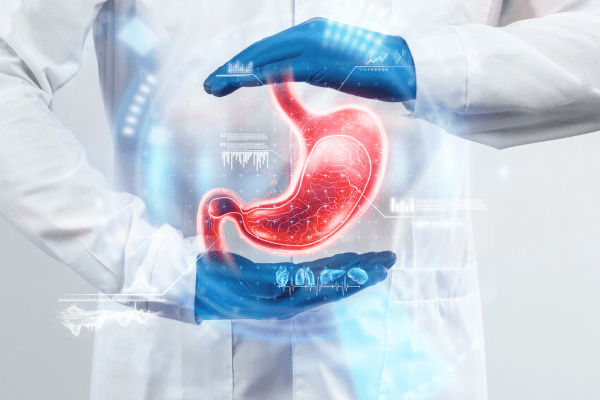GI Surgery
- Home
- GI Surgery

Are you looking for the best GI surgeon in Thrissur? Dr. Arun S. Nair is a highly qualified and efficient gastroenterologist and gastrointestinal surgeon in Thrissur, Kerala. He has gained immense knowledge and extensive exposure to a broad range of gastrointestinal surgeries during his training and working. Dr. Arun S. Nair also trained in advanced gastrointestinal surgery at Tsukuba University Hospital in Japan and advanced HPB surgery at IRCAD University in Taiwan. He got a vast experience in managing complex gastro-intestinal surgical problems, including those with previous surgeries and their complications. His knowledge and expertise make him one of the best GI surgeons in Thrissur, Kerala. He has done multiple paper and video presentations at national and international conferences. There are many publications on his name in national and international journals. In addition to his professional achievements, Dr. Arun S. Nair is a member of esteemed medical associations in India.
What is GI Surgery?
Gastrointestinal (GI) surgery addresses digestive system problems such as the esophagus, stomach, small intestine, colon, liver, gallbladder, and pancreas. These procedures are used to treat gastrointestinal malignancies, inflammatory bowel disease, gallstones, hernias, and other disorders.
Types of the GI Surgery Performed by Dr. Arun Nair :
Esophageal Surgery:
- Esophagectomy for Esophageal Cancer: This procedure involves removing part or all of the esophagus to treat esophageal cancer and sometimes requires reconstructive surgery.
- Nissen Fundoplication for GERD: It is a surgical procedure to treat gastroesophageal reflux disease (GERD) by wrapping the upper part of the stomach around the lower esophagus to prevent stomach acid from flowing back into the esophagus.
- Heller Myotomy for Achalasia: This surgery involves cutting the muscles at the lower end of the esophagus to ease the passage of food into the stomach for patients with achalasia.
Gastric Surgery:
- Gastrectomy for Gastric Cancer: Gastrectomy involves partial or total removal of the stomach to treat gastric cancer.
- Bariatric Surgery: Dr. Nair performs various weight loss surgeries, including gastric sleeve and gastric bypass, to help patients with obesity achieve significant and sustained weight loss.
Intestinal Surgery:
- Bowel Resection: It involves removing a portion of the intestine affected by conditions like Crohn’s disease, ulcerative colitis, or cancer.
- Bowel Obstruction Surgery: Dr. Nair performs surgical interventions to relieve intestinal blockages caused by tumors, adhesions, or hernias.
- Diverticular Disease Surgery: Surgery may be required to treat complications of diverticular disease, such as diverticulitis or abscess formation.
Colorectal Surgery:
- Colorectal Surgery – Colorectal surgery treats problems with the colon, rectum, and anus. Dr. Arun Nair specializes in the treatment of a variety of colorectal surgery including:
- Colorectal Cancer Surgery – The surgical treatment of colorectal cancers, which frequently includes tumor removal, lymph node dissection, and possibly colostomy or ileostomy surgeries.
- Inflammatory Bowel Disease (IBD) Surgery – Surgical treatments for illnesses such as Crohn’s disease and ulcerative colitis that may include removing damaged organs.
Hepatobiliary Surgery:
- Liver Resection: This procedure involves removing part of the liver affected by tumors or other liver diseases.
- Bile Duct Surgery: Surgical interventions to treat bile duct diseases, including strictures and stones.
Pancreatic Surgery:
- Whipple Procedure (Pancreaticoduodenectomy): A complex surgery to treat pancreatic cancer involving the removal of the head of the pancreas, part of the small intestine, the gallbladder, and the bile ducts.
- Distal Pancreatectomy: Surgical removal of the tail or body of the pancreas, often required for pancreatic tumors or chronic pancreatitis.
Types of the GI Surgery Performed by Dr. Arun Nair :
GI surgery offers numerous benefits to patients, depending on the specific procedure performed. Some common advantages include:
- Alleviation of Symptoms: GI surgeries can relieve pain, discomfort, and digestive issues associated with various gastrointestinal conditions.
- Improved Quality of Life: Treating GI diseases enhances overall well-being, allowing patients to lead more active and healthier lives.
- Cancer Treatment: Surgical removal of tumors can be curative for certain GI cancers when detected at an early stage.
- Weight Loss and Metabolic Improvement: Bariatric surgery aids in significant weight loss, which can lead to improved metabolic health and reduced obesity-related comorbidities.
- Minimally Invasive Techniques: Laparoscopic approaches result in smaller incisions, reduced scarring, shorter hospital stays, and faster recovery compared to traditional open surgery.
- Reduced Complications: The precision and accuracy of robotic surgery can lead to fewer complications during and after the procedure. This can result in fewer post-operative infections, reduced risk of bleeding, and decreased chances of other complications.
Cost of the GI surgery in thrissur:
The cost of GI surgery varies depending on criteria such as operation type, hospital facilities, and individual medical needs. We invite you to schedule a consultation with Dr. Arun Nair to get exact cost facts.
Why Choose Dr. Arun S Nair for GI surgery procedure

Vast Experience
Dr. Arun Nair is well-known for his wide knowledge and achievements in the field of laparoscopic surgery. He currently serves as a Senior Consultant in the Department of Surgical Gastroenterology and Advanced Laparoscopic Surgery at Elixir Clinic and He has more than 15 years of experience in laparoscopic surgery and Robotic Surgery.

Expertise
Dr. Arun S Nair has expertise in performing laparoscopic surgery for multiple condition such as hernia, gallstone, cancer surgery, HPB surgery. He performed more than thousands of laparoscopic surgery.

Handling Complex Cases
His successful execution of laparoscopic double bypass in locally advanced pancreatic cancer demonstrates his ability to handle intricate and challenging cases with precision.

Patient-Centric Approach
Dr. Arun Nair prioritizes patient well-being and safety, ensuring that each procedure is tailored to the individual's needs and circumstances.

State-of-the-Art Facilities
Dr. Arun Nair's practice is equipped with the latest technology, allowing for the highest standard of laparoscopic surgical interventions.

Location Accessbility
Dr. Arun S Nair avaialbe at Exclir Clinic, Thrissur, Daya General Hospital and St. Gregorios Medical Mission Multi-Speciality Hospital. So patient can easily choose hospital as their conveience.
Book an Appointment
To book an appointment with Dr. Arun Nair for a GI surgery consultation, patients can contact the provided appointment phone numbers or visit the official website. The friendly and efficient staff will assist in scheduling the appointment at a convenient time.
Frequently Asked Questions (FAQ's):
The recovery period for gastrointestinal (GI) surgery can vary greatly based on various factors, including the type of surgery done and the overall health of the particular patient.
You may be unable to eat or drink immediately following surgery. When your body is ready, your doctor will most likely advise you to consume only clear fluids for 1 to 3 days. This implies that you will be unable to consume solid foods. Before consuming solid meals, your doctor may advise you to follow a full fluid diet.
A gastroenterologist focuses on diagnosing and treating non-surgical gastrointestinal conditions, while a gastro surgeon specializes in performing surgical procedures to address complex gastrointestinal disorders. Depending on the nature of your condition, you may be referred to either a gastroenterologist or a gastro surgeon for appropriate care. It’s important to consult with your primary care physician or a medical specialist to determine the most suitable course of action for your specific medical needs.
GI surgery can treat a range of conditions, including colorectal cancer, gallbladder diseases, hernias, gastroesophageal reflux disease (GERD), inflammatory bowel disease (IBD), and more.
GI surgery can be performed using open surgery (larger incisions) or minimally invasive techniques like laparoscopic or robotic surgery (smaller incisions). The choice of technique depends on the specific procedure and patient’s condition.
Recovery times vary based on the procedure and individual factors. Minimally invasive techniques often result in faster recovery compared to traditional open surgery.
Google Review
EXCELLENTTrustindex verifies that the original source of the review is Google. Dr. Arun S. Nair is an exceptional surgeon whose expertise and dedication were evident throughout my father’s treatment. From the very first consultation, he took the time to explain the procedure in detail, addressing all our concerns with patience and clarity. His calm and confident approach reassured us that my father was in the best hands. During the surgery and recovery process, he remained attentive, ensuring everything went smoothly and that my father was comfortable. His professionalism, skill, and genuine concern for his patients make him a truly outstanding doctor. Leena, was equally remarkable. She was always available to answer our questions, provide updates, and offer emotional support. Her warmth and kindness made a huge difference, not just for my father but for our entire family. She treated us with care and respect, making sure we felt heard and supported every step of the way. Together, Dr. Nair and Leena create a team that goes above and beyond for their patients. We are incredibly grateful for their care and would highly recommend them to anyone in need of medical treatment. Susanna Parackal Varghese D/O P T VargheseTrustindex verifies that the original source of the review is Google. We’ve had an amazing experience with Dr. Arun S. Nair. When my dad got sick, I found Arun online and reached out to his assistant. He has been nothing but exceptional in patient care. He did a very long and complicated gastral surgery on my dad and he came out of it perfectly fine. Dr Arun, his associates Dr Aishwarya and Leena are very talented people and great at supporting the patient throughout the process. I was constantly in touch with all of them over the phone and they were very helpful to all of us. If you have any gastric related issues, please always go to Dr Arun.Trustindex verifies that the original source of the review is Google. Good treatmentTrustindex verifies that the original source of the review is Google. Dr. Arun S Nair is a skilled gastro surgeon known for his kindness and politeness towards patients.Trustindex verifies that the original source of the review is Google. I was a surgery patient here. It was nice experience and feeling goodTrustindex verifies that the original source of the review is Google. നല്ലത്Trustindex verifies that the original source of the review is Google. Right after the first consultation with Dr.Arun S Nair I gained confidence to do my hernia surgery and decided to get it done by Dr.Arun S Nair himself. Surgery was successful and I recovered within the time as previously told in the first consultation.Trustindex verifies that the original source of the review is Google. Dr. Arun S Nair totally impressed us during our first meet in February 2023 regarding my mother's surgery. Dr Arun gives courage, confidence and the way he treats patients, maybe beacause of all this I didn't have any tension. He is very friendly with everyone. I'm very satisfied with his approach. Dr. Arun S Nair is one of the best Gastro Surgeon in Kerala.Thanks again to Dr Arun sir . Special thanks goes to sister Rachel for her continuous support and assistance throughout our stay.Trustindex verifies that the original source of the review is Google. I am very satisfied and happy. Dr Arun totally impressed us during our first meet.Very happy with the friendly and compassionate aproach. All the staffs are very supportive. Thank you sir

